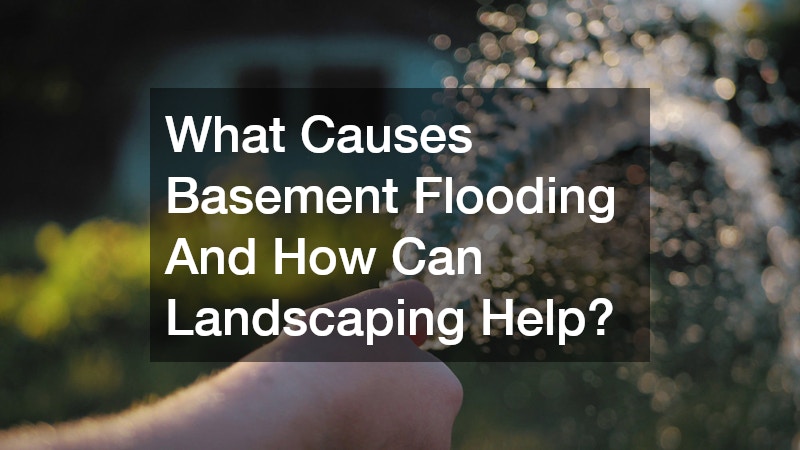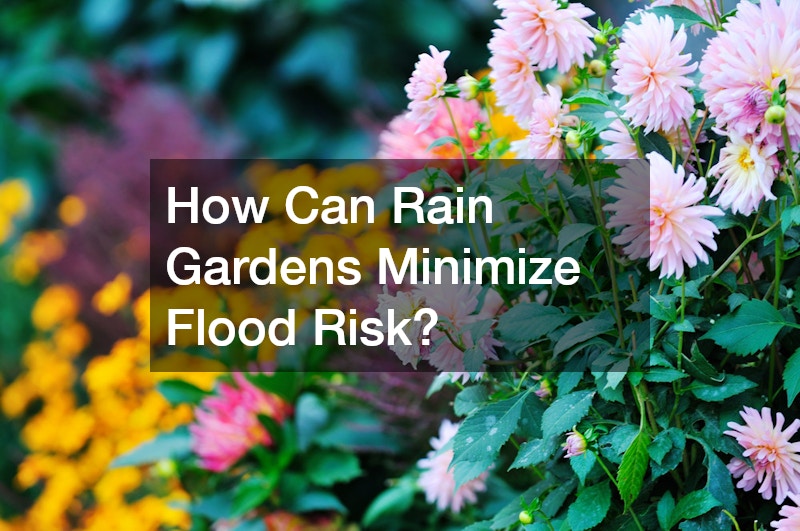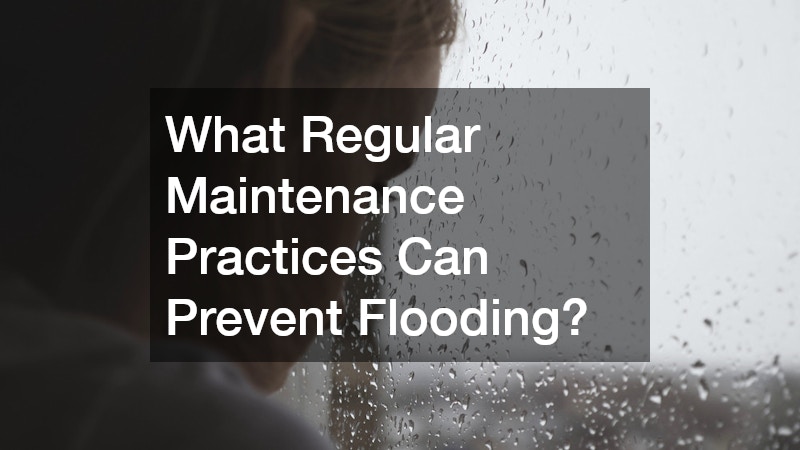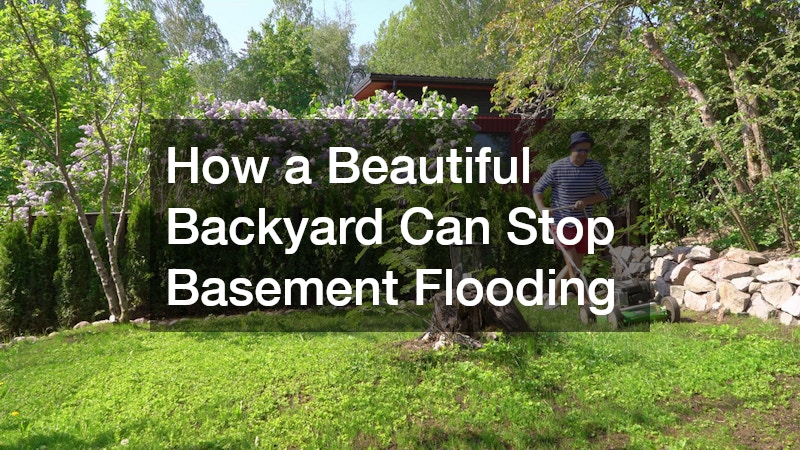When most homeowners think about backyard investments, they’re envisioning a new patio, lush gardens, or perhaps a swimming pool. What they may not realize is that certain backyard investments can actually protect one of the most vulnerable areas of their home: the basement. Basement flooding is one of the most common — and costly — home maintenance issues. A flooded basement can lead to structural damage, mold growth, and expensive repairs that no homeowner wants to face.
The good news is that you can prevent many basement water problems simply by making strategic choices in your outdoor space. A well-planned yard works hand in hand with your basement’s waterproofing systems to direct water away from your home and into appropriate drainage paths. In fact, landscaping choices, grading, plant selection, and hardscaping all contribute to a safer, drier basement.
Whether you’re planning a full backyard remodel or a simple upgrade, these thoughtful backyard investments can pay dividends — not only in beauty and usability but also in protecting your home from damage. Below, we explore how your yard and basement are connected, and how you can make smart choices to keep water where it belongs.
What Causes Basement Flooding And How Can Landscaping Help?

Understanding The Common Causes Of Basement Flooding
Basement flooding often occurs because water collects near the foundation and seeps through walls or floors. Common culprits include poor grading, clogged gutters, cracks in the foundation, and inadequate drainage systems. Basement leak repair professionals see this all the time: a little oversight outdoors can lead to big problems indoors.
Role Of Landscaping In Redirecting Water Flow
This is where your backyard investments come in. Smart landscaping not only enhances curb appeal but also directs water away from your home. Whether you’re hiring an architect design firm to design an elaborate outdoor space or simply adding a few key features yourself, you can protect your basement while making your yard more functional and beautiful.
Importance Of Assessing Your Property’s Unique Drainage Needs
Every property is different. An architect design firm or a basement waterproofing specialist can evaluate your yard’s slopes, soil type, and drainage patterns to recommend solutions tailored to your situation. Investing in this assessment upfront saves time and money in the long run.
How Can Grading Your Yard Prevent Flooding?
Basics Of Yard Grading And Its Impact On Water Flow
Grading your yard properly is one of the smartest backyard investments you can make to protect your home. Water should naturally flow away from your foundation, not toward it, but many homes suffer from improper grading that funnels rainwater right into the basement. This can lead to costly basement leak repair, mold issues, and even foundation damage over time. A professional architect design firm or a concrete masonry service can help assess your current slope and make recommendations.
Steps To Properly Grade Your Backyard
Start by identifying low spots where water collects. You may need to remove soil near the foundation and add it further out to create a slope of at least six inches over the first ten feet. A concrete masonry service can help with more complex grading, especially if you’re incorporating hardscaping elements.
Common Mistakes To Avoid When Grading
Avoid overcompensating by creating steep slopes that cause erosion. Work with professionals like an architect design firm to achieve a balance between effective drainage and aesthetic appeal.
What Are The Benefits Of Installing A French Drain?
How French Drains Work To Prevent Water Intrusion
A French drain is another effective backyard investment for homeowners who deal with persistent water problems. It’s more than just a trench — it’s a strategic drainage system that collects and redirects groundwater before it reaches your foundation. Not only does this reduce the need for basement waterproofing later, but it also helps preserve your landscaping by managing runoff properly.
Steps To Install A French Drain In Your Backyard
While you can DIY this, many homeowners hire basement waterproofing experts or even concrete masonry services to ensure it’s done right. Proper installation is key to long-term performance.
Maintenance Tips To Keep Your French Drain Effective
Inspect and flush the drain periodically to prevent clogs. This small maintenance task can save you from calling mold and mildew removal professionals after a flood.
How Can Rain Gardens Minimize Flood Risk?

Understanding The Functionality Of Rain Gardens
Rain gardens are a beautiful and functional addition to any yard. These eco-friendly backyard investments collect and absorb rainwater that would otherwise pool near your foundation. By slowing down runoff and encouraging it to soak into the ground, a rain garden helps prevent basement flooding and protects the environment at the same time.
Choosing The Right Plants For Effective Water Absorption
Select native plants with deep roots, as these help absorb more water and stabilize soil. A landscape architect design firm can recommend the best plants for your region.
Design And Placement Considerations For Maximum Benefit
Place your rain garden in a natural low spot or where downspouts discharge water. Be mindful of distance from the house to avoid creating new problems.
What Role Does Soil Type Play In Water Absorption?
Identifying Different Types Of Soil And Their Properties
Soil type is an often-overlooked factor when planning backyard investments. Heavy clay soils tend to hold water, creating runoff and pooling that can harm your basement. Sandy soils drain quickly but may not support healthy plants without amendment.
Techniques To Improve Soil Drainage Capabilities
Understanding your soil’s characteristics helps you choose the right drainage solutions. Improving soil drainage can involve adding organic material, compost, or sand — even during a basement remodel project — to enhance performance. Permeable paving is also a good option for areas with poor soil drainage.
Using Soil Amendments To Enhance Absorption
Many homeowners also consult with basement waterproofing or basement leak repair specialists to assess soil impact around their home. Adjusting your soil with the right amendments is a low-cost yet powerful backyard investment that complements larger drainage systems and protects your foundation from damage.
How Can Trees And Shrubs Help With Water Management?
Benefits Of Trees And Shrubs For Water Retention
Trees and shrubs are one of the most natural and visually pleasing backyard investments you can make. They act as living water management tools, absorbing significant amounts of rainfall and stabilizing soil to prevent erosion.
Strategic Planting Locations And Techniques
Strategic placement is essential — trees planted too close to the foundation can cause root problems or direct water toward your basement instead of away from it. An architect design firm or even bathroom remodeling companies experienced in moisture mitigation can advise on the best locations.
Recommended Tree And Shrub Species For Drainage
Native species generally require less maintenance and adapt well to local conditions. The right trees and shrubs also provide shade, improve air quality, and enhance your yard’s overall beauty, making them a multipurpose investment. When combined with grading and other drainage features, these plants can significantly reduce your reliance on mold and mildew removal or expensive basement leak repair later.
What Are The Advantages Of Permeable Paving?

Overview Of Permeable Paving Materials And Design
Permeable paving is a smart choice for homeowners who want their backyard investments to be both beautiful and functional. Unlike traditional concrete, permeable paving materials allow water to seep into the ground instead of running off into storm drains — which helps keep your basement dry.
Installation Tips For Effective Permeable Paving
Working with a concrete masonry service ensures your installation is level and effective. Over time, permeable paving not only reduces flood risks but also helps recharge groundwater and cool your outdoor spaces.
Long-Term Benefits Of Permeable Surfaces For Drainage
Combined with proper grading and planting, permeable surfaces are an excellent complement to basement waterproofing systems. They’re an environmentally friendly choice that protects your foundation while boosting curb appeal — a truly forward-thinking backyard investment.
How Can Gutters And Downspouts Be Optimized?
Importance Of Proper Gutter And Downspout Alignment
It’s easy to forget how crucial gutters and downspouts are to your home’s drainage system. Yet optimizing them is one of the simplest and most cost-effective backyard investments. Proper alignment and adequate length ensure that water flows away from your foundation rather than pooling near your basement walls.
Techniques To Extend Downspouts Away From Foundation
Installing splash blocks or underground extensions can prevent water from undermining your backyard investments and necessitating basement leak repair down the road.
Routine Maintenance For Efficient Water Redirecting
Regular window cleaning often uncovers clogged gutters and downspouts, which can exacerbate water problems. Professional services can help maintain these systems, ensuring efficiency and extending their lifespan. Together with grading, planting, and permeable paving, well-maintained gutters and downspouts form a comprehensive defense against water intrusion — sparing you from calling mold and mildew removal specialists in the future.
Can Retaining Walls Assist In Controlling Water Runoff?
Function And Benefits Of Retaining Walls In Landscapes
Retaining walls serve a dual purpose: they’re visually striking and highly functional. These backyard investments help control slopes, stabilize soil, and redirect water flow away from your home. A well-designed retaining wall can prevent erosion and stop water from reaching your foundation — protecting your basement and the rest of your property.
Key Design Considerations For Building Retaining Walls
When planning a wall, it’s important to work with an architect design firm to ensure it integrates seamlessly with your overall drainage plan.
Integrating Retaining Walls With Overall Drainage Plans
Retaining walls often complement other water management features like grading, rain gardens, and French drains. For more complex designs, a concrete masonry service may also be involved. When done correctly, retaining walls don’t just manage water — they also increase usable space in your yard, making them one of the most rewarding backyard investments you can make.
What Regular Maintenance Practices Can Prevent Flooding?

Seasonal Checks And Clean-Ups For Optimal Drainage
Even the best backyard investments require regular upkeep to remain effective. Seasonal maintenance is crucial: check gutters, downspouts, and yard slopes after heavy rains or snowmelt.
Identifying And Addressing Early Signs Of Water Issues
Early detection of potential issues — like damp spots in your basement or pooling in your yard — allows you to address them before they escalate. Regular window cleaning, for instance, can reveal clogged gutters or downspouts that could compromise your drainage system. Homeowners should also stay vigilant about soil erosion and plant health.
Professional Services For Comprehensive Water Management
For larger properties or rental homes, commercial property water remediation companies can offer inspections and guidance. Some maintenance tasks, such as electrical service checks for sump pumps or consultations with bathroom remodeling companies for basement humidity control, go beyond the yard but support the same goal: a dry, safe home. By making regular maintenance part of your routine, you extend the life and effectiveness of your backyard investments while keeping your basement in good condition.
Conclusion
Basement flooding may seem inevitable, but it doesn’t have to be. By investing in the right backyard investments, you can enjoy a beautiful outdoor space while protecting your home’s foundation and basement from costly damage. From grading your yard to installing French drains and rain gardens, every choice you make above ground impacts what happens below.
Thoughtful landscaping, hardscaping, and regular maintenance work together to redirect water away from your home. Whether you’re working with an architect design firm, hiring a concrete masonry service, or simply planting trees yourself, the key is to focus on solutions tailored to your property’s unique needs.
Don’t forget to keep up with seasonal maintenance like gutter checks and window cleaning, and consider enlisting professionals like basement waterproofing companies, basement leak repair specialists, and mold and mildew removal services when necessary. Even commercial property water remediation companies and bathroom remodeling companies can offer insights if you’re renovating a rental or multifamily property. And for bigger projects, you may even need electrical service upgrades to support sump pumps or other water management systems.
In the end, your outdoor space isn’t just for show — it’s a crucial part of your home’s defense system. With the right backyard investments, you can enjoy peace of mind knowing your basement is dry, safe, and ready for whatever nature throws your way.
